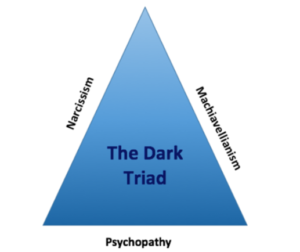Author: Celia Denton (PTES Consulting)
The term “dark triad” in personality assessments refers to a trio of negative personality traits – narcissism, Machiavellianism and psychopathy, which share some common malevolent features.
Source: Scientific American.
People with these traits tend to be callous and manipulative, and willing to do or say practically anything to get their way. They have an inflated view of themselves and are often shameless about self-promotion. They are often associated with tendencies toward violence and criminal activity. Even when they don’t slip to those extremes, the trio usually spells self-serving, manipulative, and low-empathy behaviour.
While many researchers consider psychopathy, narcissism, and Machiavellianism as three distinct traits with overlapping characteristics, others believe the commonalities suggest an underlying personality construct that has yet to be fully understood.
Trait one: Narcissism
Of the three dark traits that make up the dark triad personality, narcissism is probably the most commonly misdiagnosed. Often people will point to individuals who exhibit selfish behaviour and call them narcissists. If this were the case we would all be narcissists at times. However, the clinical definition of narcissism goes a bit further.
Narcissism is a concern with one’s self to the extreme. While everyone will be guilty of putting their own needs first from time to time, narcissists will do this almost as a rule. Often, narcissists will have a difficult time forming and maintaining relationships with others since that would require them to consider someone’s needs outside of their own.
Trait two: Subclinical psychopathy
To understand what subclinical psychopathy is, first you need to understand psychopathy.
Psychopathy, like narcissism, is a word that is thrown around more often than is actually appropriate, at least in a clinical sense. A true psychopath is someone who exhibits antisocial behaviours. They show a lack of empathy or remorse, and typically have dampened impulse control. It is important to note that these aren’t one-off occurrences – they are typically unrelated to the instances that you can name from common everyday life experiences. For true psychopaths, this lack of empathy and remorse form the rule and not the exception to their behaviour.
The difference is instead quantitative. True clinical psychopaths are those whose abnormal or anti-social behaviour permeates most or every area of their lives. A subclinical psychopath on the other hand is an individual who exhibits these same behaviours, but the effect on their lives is lessened because the rate and extremity of the behaviour is lower.
Trait three: Machiavellianism
Machiavellianism, as its name suggests, can be summed up as a personality type that incorporates the ideas put forth by Niccolo Machiavelli. Niccolo Machiavelli was a Renaissance philosopher who described how a head of state ought to behave in one of his most acclaimed works, “The Prince.”
One of the main themes of the book is that the ends justify the means – and it is this very theme that underscores Machiavellianism as a personality type. Those who exhibit Machiavellianism are highly manipulative. Societally, they are often viewed as adept liars, however, their deception often runs much deeper. Machiavelli notes in “The Prince” that a true Machiavellian personality inherently understands the importance of appearing forthcoming, while using deceit to obtain what they want.
How to recognise the dark triad
The dark triad attempts to capture manipulative, exploitative traits that are not represented by the Big 5, a five-factor model of the core traits of an individual’s personality which is considered the most reliable and widely used model of personality to date. To identify these traits in clinical settings, clinicians and researchers typically use individual scales measuring narcissism, psychopathy and Machiavellianism separately, or a 12-item scale known as the “Dirty Dozen” that is designed to measure all three at once.
Do dark triad individuals easily conceal their true nature?
Though there are physical and behavioural cues that have been shown to be associated with the dark triad in research settings, individuals with these traits may excel at hiding their true nature, especially at first. Narcissists, for instance, often appear charming and likable upon first meeting; some evidence suggests that this may be due to the perception that they have high self-esteem, a socially desirable trait.
How can I spot a dark triad individual?
It can be difficult to spot someone high in dark triad traits, and without a formal evaluation, you may never know for sure. But someone who repeatedly lies, demonstrates a marked lack of empathy, or bullies others to achieve their own goals may be high in one or more dark traits. Suffice to say, that these aren’t the traits to be looking for when taking on new hires!
If you are in need of a tried, tested and trusted psychometric solution for your staff, then look no further. Contact us on [email protected] for more information.


